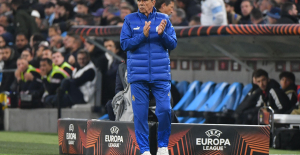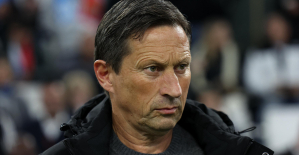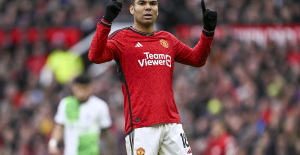WORLD: Mr. Kuban, the CDU has been an opposition party for a year. What is your assessment - what grade would you give the party?
Tilman Kuban: After the federal elections, we brought the party leadership and party base together again. We, the Junge Union, have long fought to involve the members in the election of a new party leader.
In the meantime, the CDU is on the right track with Friedrich Merz. So last year we worked our way up from a four to a two.
WORLD: How do you rate the performance of Friedrich Merz as the new party and parliamentary group leader?
Kuban: With Russia's attack on Ukraine immediately after he was elected party leader, there was a major turning point for politics in the entire Western world. In this phase, the Union rightly acted in a very state-supporting manner.
When the federal government did not follow up on its words in supporting Ukraine with action, Friedrich Merz had to take a different course in order to get weapons to Ukraine. In the coming months it will now be a question of setting up the party in terms of content and structure in such a way that it is campaignable again.
WORLD: How is the party currently positioned? The general secretary too colorless, the party headquarters chaotically organized, at least critics say.
Kuban: That is an unjust verdict. In the past few months, the focus has rightly not been on internal party issues, but on the global political situation and thus the work of the parliamentary group. With Friedrich Merz at the helm, they did a very good job.
Now we are entering another phase. We must act correctly in the energy war that the Kremlin has declared and also regain substance in the party in order to be able to govern by 2025 at the latest. Carsten Linnemann's process for the basic program is a good start for this.
WORLD: In the middle of a major world crisis, the CDU party congress will deal with an internal quota for women and compulsory service for young people. Are these the right topics at this point in time?
Kuban: I didn't put these issues on the agenda and I think it's very right that we are now setting a different emphasis with the main proposal on energy policy.
WORLD: In it, the CDU calls, among other things, for a gas price cap and a significantly higher energy allowance for lower income groups. That's right?
Kuban: How the SPD, as a former workers' party, can still look in the mirror after this package is beyond me. The traffic light relieves above all housing benefit recipients and only then again income from 35,000 to 40,000 euros income, where the mitigation of the cold progression is really effective.
Those on low incomes who get up in the morning, take their children to daycare and go to work are simply forgotten. That's a scandal. That's why real help is finally needed here.
At the same time, we want to deliver reliability when it comes to energy costs with a concept that demands savings from people, but enables cheap energy with consumption at the previous year's level. Challenge and promote.
WORLD: These are not entirely new topics. Has the CDU overslept the topic of restructuring the energy industry in the past?
Kuban: I'm not one of the heroes of the third half who now know everything better. We have a new situation with Russia's attack on Ukraine. All centrist parties have previously believed in change through trade. As we now know, that was naïve. The younger members of the Bundestag in particular are primarily concerned with the question of which concepts we want to use to organize our energy in the future.
From my point of view, we can no longer say on the one hand that we need more renewables and on the other hand stick to our old positions - with rigid distance rules for wind turbines or with wind turbines in the forest. We have to debate that.
WORLD: The Junge Union recently spoke out against the introduction of a women's quota for the CDU committees. Can you live with the compromise made by the federal executive board to introduce a kind of temporary quota?
Kuban: The women in the Junge Union tell me that they want to get ahead because they are good, not because they are women. The decision of the Junge Union is clear.
WORLD: Another debate that the party wants to have in Hanover revolves around the introduction of general compulsory service. How do you feel about this?
Kuban: In the past, the CDU made too many decisions without first hearing and discussing with the younger generation - from upload filters to climate policy to corona measures.
In this respect, I advocate that we first discuss the subject of compulsory military service at eye level with younger people before we as a party make a decision. After all, it's the young people who have to fulfill this duty, and they don't sit at the party congress.
WORLD: The Junge Union advocates a BAföG reform in one of its applications. Away from social benefits for some students towards interest-free loan promotion. What do you expect from this?
Kuban: "BAföG for everyone", as planned by the traffic light coalition, cannot be the solution. It's expensive and unfair to those who don't study. Our proposal for the national education fund is therefore: Anyone who wants support to complete their studies should get it.
But he also has to repay this benefit to a large extent when he works later. If you earn well after your studies, you should pay back the help you have claimed. It cannot be right that the nurse finances the studies of her next chief physician.
WORLD: You yourself demanded in the run-up to the party congress that the CDU had to "renew" itself in terms of content but also structurally, regaining substance? Where exactly do you see the need for renewal in the party?
Kuban: I want us to inspire and get more people to join us again. Here we have to find new ways in politics. Young people no longer join parties because it is considered good manners, but because they want to make a difference. They don't want to sit down in a dusty hall with the deer on the wall and the white tablecloth on the blackboard and then listen to the chairman's monologue.
They want to join the debate, contribute their knowledge and implement projects. So we should adapt the way we do politics. One idea would be to offer project-related work in the CDU, as we know from citizens' initiatives.
"Kick-off Politics" is WELT's daily news podcast. The most important topic analyzed by WELT editors and the dates of the day. Subscribe to the podcast on Spotify, Apple Podcasts, Amazon Music, among others, or directly via RSS feed.

 Sydney: Assyrian bishop stabbed, conservative TikToker outspoken on Islam
Sydney: Assyrian bishop stabbed, conservative TikToker outspoken on Islam Torrential rains in Dubai: “The event is so intense that we cannot find analogues in our databases”
Torrential rains in Dubai: “The event is so intense that we cannot find analogues in our databases” Rishi Sunak wants a tobacco-free UK
Rishi Sunak wants a tobacco-free UK In Africa, the number of millionaires will boom over the next ten years
In Africa, the number of millionaires will boom over the next ten years Can relaxation, sophrology and meditation help with insomnia?
Can relaxation, sophrology and meditation help with insomnia? WHO concerned about spread of H5N1 avian flu to new species, including humans
WHO concerned about spread of H5N1 avian flu to new species, including humans New generation mosquito nets prove much more effective against malaria
New generation mosquito nets prove much more effective against malaria Covid-19: everything you need to know about the new vaccination campaign which is starting
Covid-19: everything you need to know about the new vaccination campaign which is starting For the Olympics, SNCF is developing an instant translation application
For the Olympics, SNCF is developing an instant translation application La Poste deploys mobile post office trucks in 5 rural departments
La Poste deploys mobile post office trucks in 5 rural departments Meta accelerates into generative artificial intelligence with Llama 3
Meta accelerates into generative artificial intelligence with Llama 3 In China, Apple forced to withdraw WhatsApp and Threads applications at the request of the authorities
In China, Apple forced to withdraw WhatsApp and Threads applications at the request of the authorities The main facade of the old Copenhagen Stock Exchange collapsed, two days after the fire started
The main facade of the old Copenhagen Stock Exchange collapsed, two days after the fire started Alain Delon decorated by Ukraine for his support in the conflict against Russia
Alain Delon decorated by Ukraine for his support in the conflict against Russia Who’s Who launches the first edition of its literary prize
Who’s Who launches the first edition of its literary prize Sylvain Amic appointed to the Musée d’Orsay to replace Christophe Leribault
Sylvain Amic appointed to the Musée d’Orsay to replace Christophe Leribault Skoda Kodiaq 2024: a 'beast' plug-in hybrid SUV
Skoda Kodiaq 2024: a 'beast' plug-in hybrid SUV Tesla launches a new Model Y with 600 km of autonomy at a "more accessible price"
Tesla launches a new Model Y with 600 km of autonomy at a "more accessible price" The 10 best-selling cars in March 2024 in Spain: sales fall due to Easter
The 10 best-selling cars in March 2024 in Spain: sales fall due to Easter A private jet company buys more than 100 flying cars
A private jet company buys more than 100 flying cars This is how housing prices have changed in Spain in the last decade
This is how housing prices have changed in Spain in the last decade The home mortgage firm drops 10% in January and interest soars to 3.46%
The home mortgage firm drops 10% in January and interest soars to 3.46% The jewel of the Rocío de Nagüeles urbanization: a dream villa in Marbella
The jewel of the Rocío de Nagüeles urbanization: a dream villa in Marbella Rental prices grow by 7.3% in February: where does it go up and where does it go down?
Rental prices grow by 7.3% in February: where does it go up and where does it go down? With the promise of a “real burst of authority”, Gabriel Attal provokes the ire of the opposition
With the promise of a “real burst of authority”, Gabriel Attal provokes the ire of the opposition Europeans: the schedule of debates to follow between now and June 9
Europeans: the schedule of debates to follow between now and June 9 Europeans: “In France, there is a left and there is a right,” assures Bellamy
Europeans: “In France, there is a left and there is a right,” assures Bellamy During the night of the economy, the right points out the budgetary flaws of the macronie
During the night of the economy, the right points out the budgetary flaws of the macronie These French cities that will boycott the World Cup in Qatar
These French cities that will boycott the World Cup in Qatar Europa League: “We dream of everything,” says Jean-Louis Gasset
Europa League: “We dream of everything,” says Jean-Louis Gasset Europa League: “Trouble playing our football,” admits Benfica coach
Europa League: “Trouble playing our football,” admits Benfica coach Europa League Conference: “Martinez eats all your deaths”, Obraniak’s breakdown after the elimination of Lille
Europa League Conference: “Martinez eats all your deaths”, Obraniak’s breakdown after the elimination of Lille Premier League: “It’s a team that is transforming into the Champions League”, Casemiro returned to Real’s qualification
Premier League: “It’s a team that is transforming into the Champions League”, Casemiro returned to Real’s qualification


















